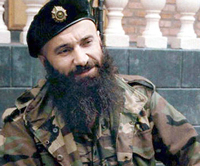Shamil Basayev’s profile
The chief of Russia's security services said Monday that Basayev had been killed in a sweep operation by Russian forces. There was no immediate independent confirmation.

Basayev had eluded Russian forces for years, despite Kremlin vows to hunt him down and an offer of US$10 million and plastic surgery to anyone providing information leading to his death.
Basayev's decade-long record of slaying both civilians and soldiers reflected fanatical determination - a ferocity Russia long claimed was bolstered by help from international terror networks like al-Qaida. Washington declared Basayev a terrorist and threat to the United States.
Basayev, 41, inflicted misery even before the Soviet Union's demise, starting with the hijacking of an airliner in 1991, a plot aimed at attracting attention to the Chechen separatist cause.
After Russian forces entered Chechnya in 1994, Basayev's exploits grew more daring. His forces buried a container of radioactive material in a Moscow park in 1995 - a warning of the mayhem they could inflict if they chose.
As a field commander, Basayev led a raid in June 1995 on the town of Budyonnovsk, in a region bordering Chechnya. Basayev outwitted the Russian military and infiltrated 200 fighters into the town, where they took hundreds of doctors and patients hostage at a local hospital.
The Russians stormed the hospital, but their bumbling caused innocent deaths - more than 100 civilians, police and soldiers were killed in Chechen gun battles with Russian troops. Basayev and his fighters used some of the hostages as human shields to escape back into Chechnya.
The raid brought Basayev fame back home. When Russian troops pulled out in 1996 and Chechnya prepared to elect a president to lead it to de facto independence, Basayev ran for the job.
He lost to the late rebel commander Aslan Maskhadov and became his deputy. He appeared at first to be trying to change from combatant to politician, trimming his flowing beard and trading his camouflage fatigues for a suit.
While Maskhadov was regarded by some observers as comparatively moderate, Basayev became an adherent of the strict Wahhabi sect of Islam, which has roots in Saudi Arabia and is the doctrine that inspires al-Qaida leader Osama bin Laden.
By 1999, Basayev, who called himself Abdullah Shamil Abu Idris, was a fighter again. He and a Saudi-born rebel leader known as Khattab seized villages in the neighboring Russian region of Dagestan, reportedly to set up an Islamic state.
The raids alarmed the Kremlin and strengthened its resolve to control Chechnya. After some 300 people died in apartment bombings that officials blamed on the rebels - an attack Basayev denied - the military swept back into the republic.
In January 2000, the Russians pounded Chechnya's capital, Grozny, for weeks with bombs and artillery fire, forcing the rebels to flee. Basayev was among the militants who blundered into a minefield, and had his leg blown off.
The injury failed to deter him. In October 2002, Chechen men with automatic rifles and women with explosives strapped to their waists seized about 800 hostages in a Moscow theater in an attack for which he claimed responsibility. Special forces pumped narcotic gas into the theater to knock out the hostage takers, but the gas ended up killing 129 hostages.
Maskhadov then said he dismissed Basayev as head of the rebels' military committee. Attacks continued.
Twin plane bombings in late August 2004 killed 90 people onboard, and an attack near a Moscow subway station killed nine, plus the bomber. Basayev claimed responsibility, and more carnage was to come within days.
In September, some 30 heavily armed militants seized more than 1,000 hostages at School No. 1 in the town of Beslan and held them for three days. The siege ended with explosions and gunfire, killing 331 people - half of them children.
Worldwide condemnation of the Beslan attack appeared to undermine support for the Chechen separatists' cause, and Basayev largely laid low thereafter. In October of last year, he claimed responsibility for organizing an attack on police facilities in the tense republic of Kabardino-Balkaria that left 139 people dead, but apparently did not participate personally in the raids.
Subscribe to Pravda.Ru Telegram channel, Facebook, RSS!




